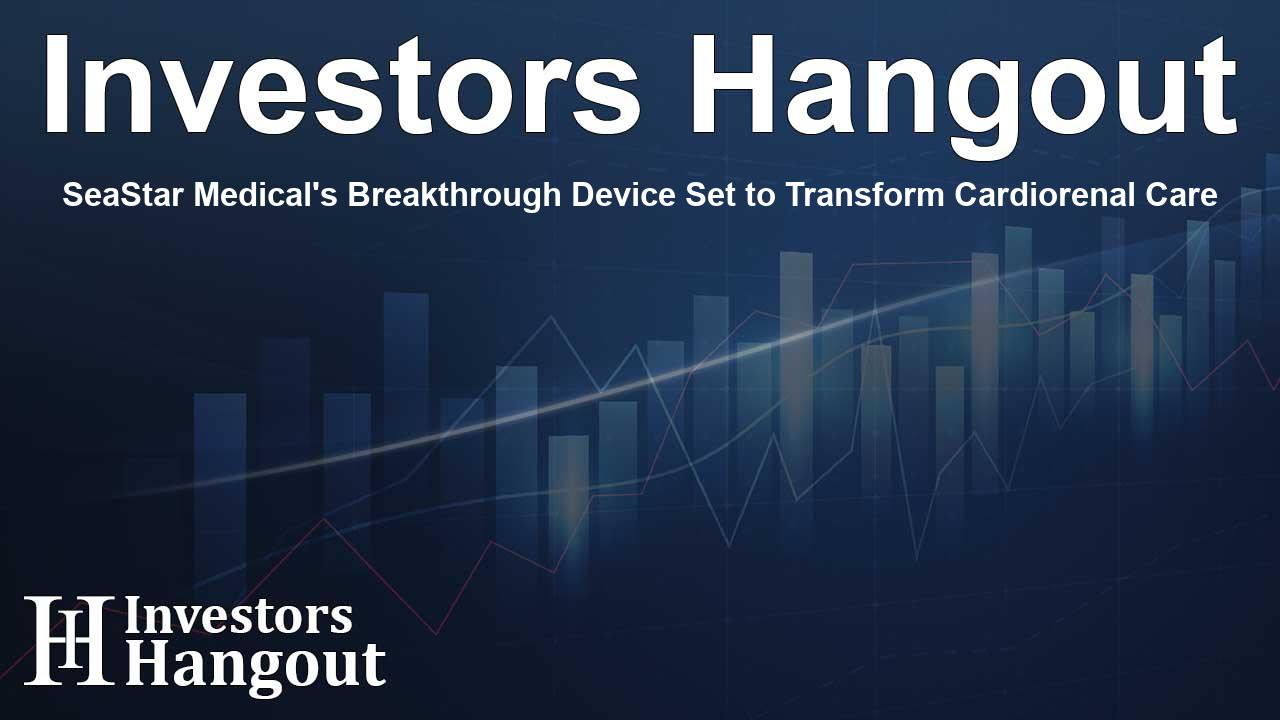SeaStar Medical's Breakthrough Device Set to Transform Cardiorenal Care

SeaStar Medical's Innovative Journey in Cardiorenal Syndrome Treatment
SeaStar Medical Holding Corporation (Nasdaq: ICU) has made significant strides in the medical device arena with the FDA's recent approval of an investigational device exemption (IDE) for its Selective Cytopheretic Device (SCD-ADULT). This exciting development marks a crucial step forward in treating adult patients suffering from cardiorenal syndrome, a condition where severe kidney issues coincide with cardiac distress.
Understanding Cardiorenal Syndrome
Cardiorenal syndrome is a complex medical condition where the heart and kidneys are interlinked, affecting each other's function negatively. Patients with severe heart failure often face worsened kidney function, complicating treatment options. The necessity for innovative therapies in this growing patient population poses both a challenge and an opportunity in the healthcare sector.
The Feasibility Study and Its Goals
The recently approved feasibility study aims to enroll 20 patients across multiple clinical sites, specifically focusing on those awaiting a left ventricular assist device (LVAD) implantation. The driving goal is to evaluate the SCD-ADULT's ability to reduce inflammation in these critically ill individuals. Funding for this $3.6 million study has been secured through a grant from the National Institutes of Health (NIH) under the leadership of Dr. H. David Humes, a prominent figure in nephrology and SeaStar Medical's scientific advisor.
Expert Insights on the Impact
Dr. Kevin Chung, Chief Medical Officer of SeaStar Medical, notes the significant hurdles faced by patients with cardiorenal syndrome, often being excluded from life-saving LVAD implantations due to their critical conditions. This study aims to assess the SCD-ADULT's effectiveness in improving patient conditions to bridge the gap to vital surgical interventions. Such findings could pave the way for more extensive pivotal studies in the future.
A Noteworthy Market Opportunity
The market potential for treating cardiorenal syndrome with the SCD-ADULT is estimated to exceed $1 billion annually in the U.S. This commercial opportunity highlights the significance of effective solutions in this domain.
Exploring Hyperinflammation
Hyperinflammation refers to a dangerous overactivity of the immune system, potentially leading to multi-organ failure and devastating health consequences. By employing innovative technology, SeaStar Medical’s device selectively targets inflammatory cells, thus aiming to mitigate the devastating effects of conditions like the cytokine storm.
Selective Cytopheretic Device Capabilities
The Selective Cytopheretic Device is a patented technology that utilizes immunomodulating principles to help restore balance in the inflammatory response during continuous renal replacement therapy (CRRT). By targeting harmful pro-inflammatory cells, the device promotes healing, reducing the need for future renal replacement therapies such as dialysis.
Broader Implications and FDA Breakthrough Designation
Beyond its application in cardiorenal syndrome, the FDA has also recognized the potential of the SCD in treating conditions such as Adult Acute Kidney Injury, Hepatorenal Syndrome, and Chronic Dialysis, granting Breakthrough Device Designation to accelerate its development.
The Role of Innovative BioTherapies (IBT)
Innovative BioTherapies, founded to drive forward the commercialization of Dr. Humes' research, plays a pivotal role in this endeavor. With federal grants supporting their innovative projects, IBT's development aims to harness cutting-edge technologies, including human cell therapies, for transformative health solutions.
SeaStar Medical's Vision
At the forefront of medical technology, SeaStar Medical is committed to redefining extrinsic therapies and addressing the critical challenges posed by excessive inflammation. Their mission focuses on delivering life-saving solutions through a scientific approach, targeting the core of systemic inflammation that leads to significant organ damage.
Frequently Asked Questions
What is cardiorenal syndrome?
Cardiorenal syndrome is a complex and often severe condition where heart and kidney dysfunctions occur together, negatively impacting patient outcomes.
What does the Selective Cytopheretic Device do?
The SCD is designed to reduce harmful inflammation in patients, specifically during renal treatments, targeting activated immune cells to promote healing.
How is the SCD-ADULT study funded?
The study receives funding from a $3.6 million NIH grant awarded to Innovative BioTherapies, highlighting the importance of research in this field.
Who is leading the clinical study?
Dr. H. David Humes, a renowned nephrologist, has been appointed as the lead investigator for the feasibility study.
What potential does the SCD-ADULT have in the market?
The annual market opportunity for the SCD-ADULT in treating cardiorenal syndrome is projected to surpass $1 billion, emphasizing its commercial viability.
About The Author
Contact Olivia Taylor privately here. Or send an email with ATTN: Olivia Taylor as the subject to contact@investorshangout.com.
About Investors Hangout
Investors Hangout is a leading online stock forum for financial discussion and learning, offering a wide range of free tools and resources. It draws in traders of all levels, who exchange market knowledge, investigate trading tactics, and keep an eye on industry developments in real time. Featuring financial articles, stock message boards, quotes, charts, company profiles, and live news updates. Through cooperative learning and a wealth of informational resources, it helps users from novices creating their first portfolios to experts honing their techniques. Join Investors Hangout today: https://investorshangout.com/
The content of this article is based on factual, publicly available information and does not represent legal, financial, or investment advice. Investors Hangout does not offer financial advice, and the author is not a licensed financial advisor. Consult a qualified advisor before making any financial or investment decisions based on this article. This article should not be considered advice to purchase, sell, or hold any securities or other investments. If any of the material provided here is inaccurate, please contact us for corrections.
